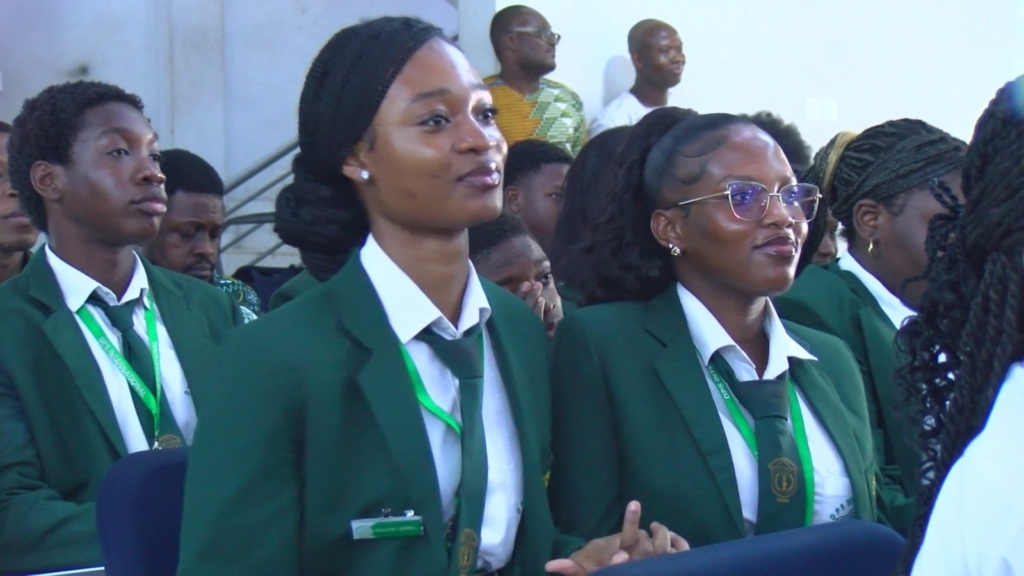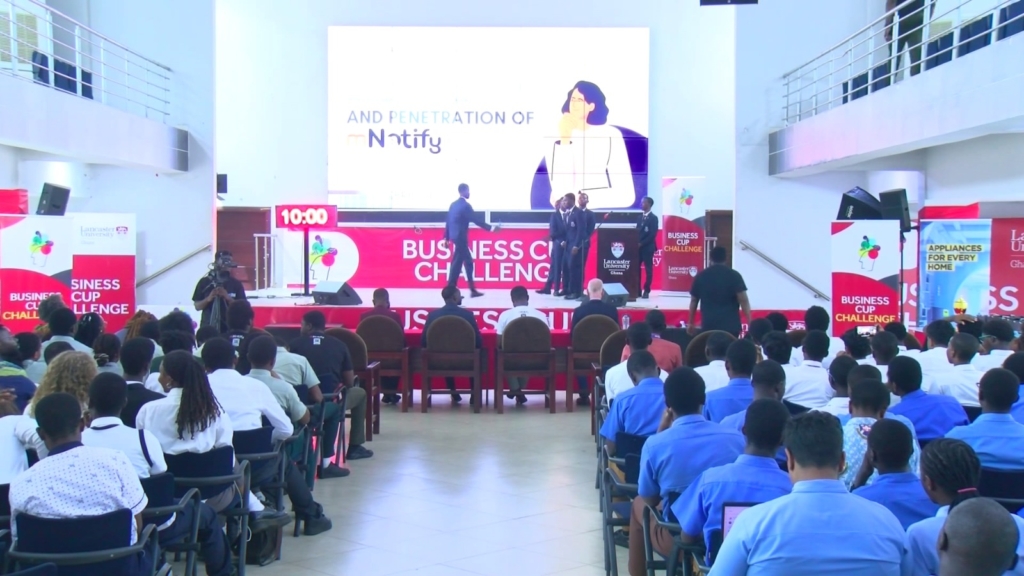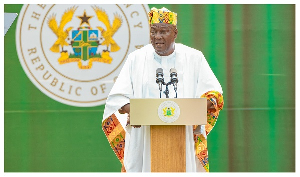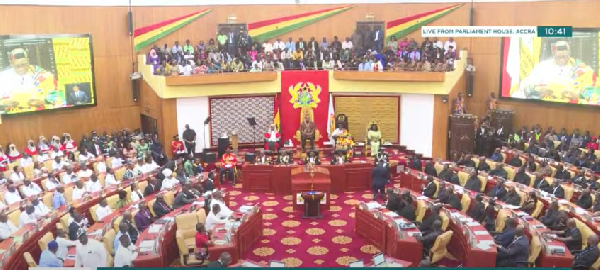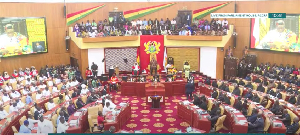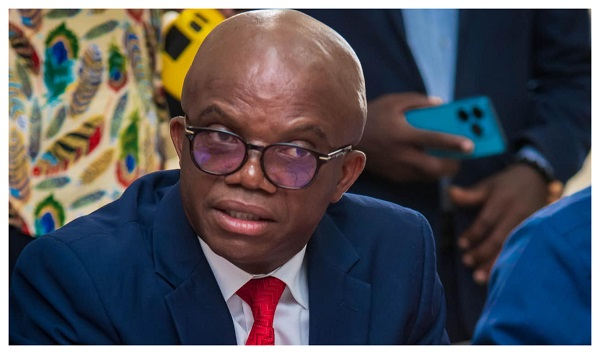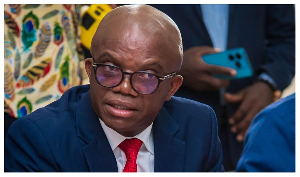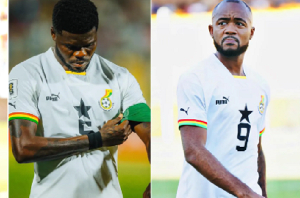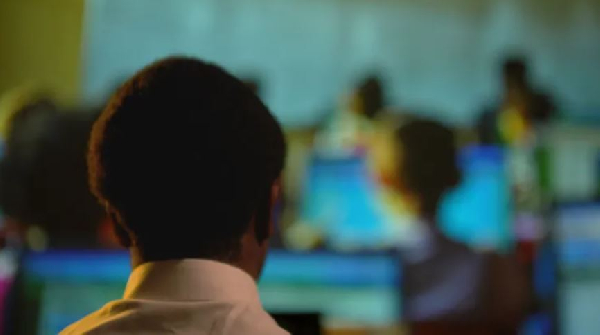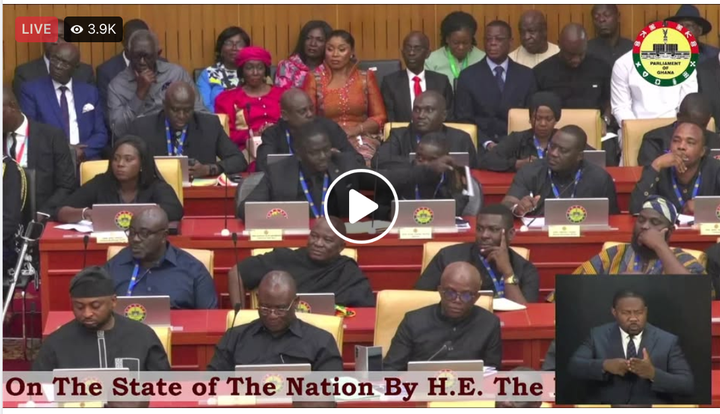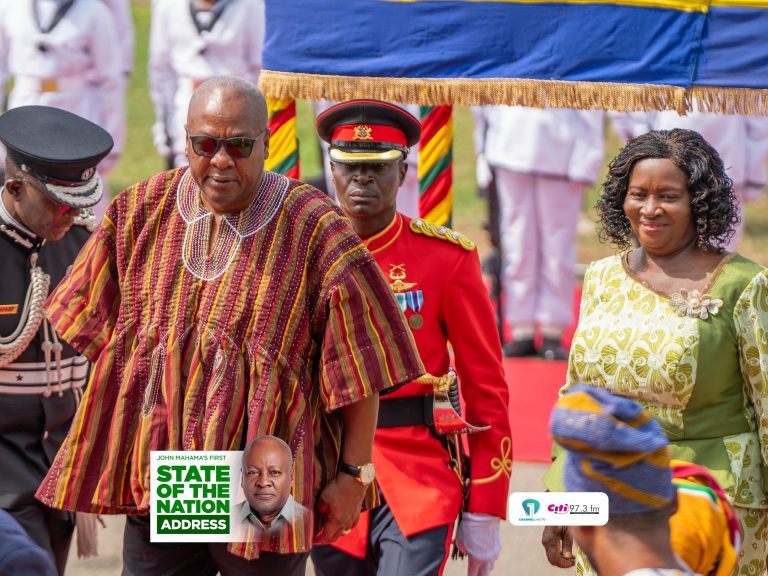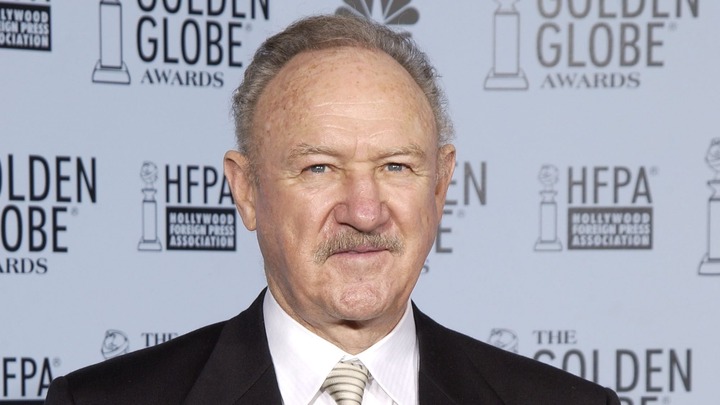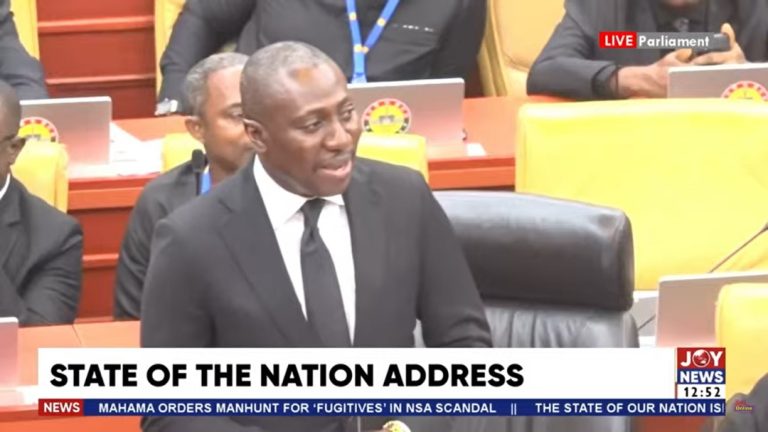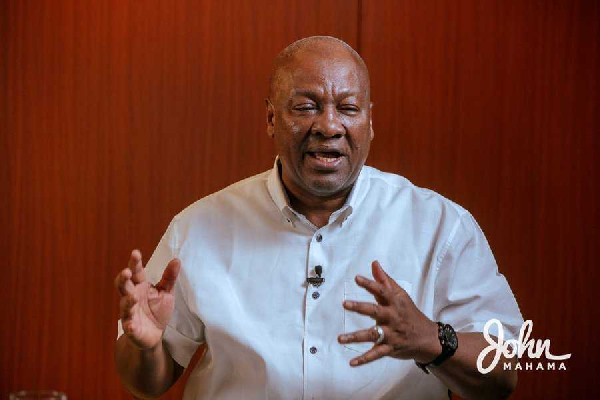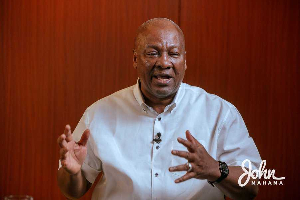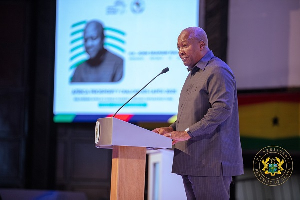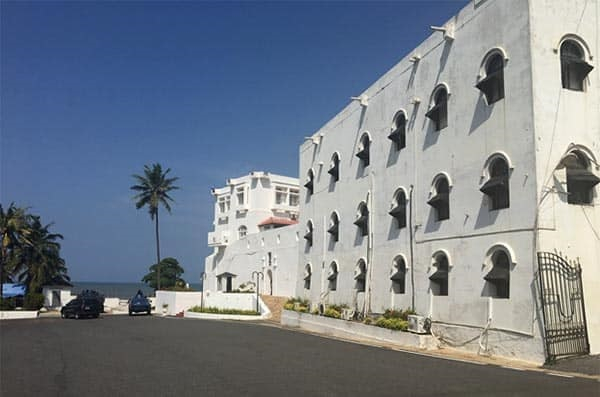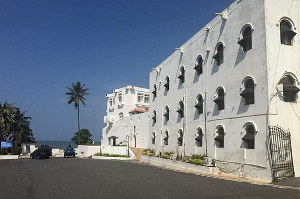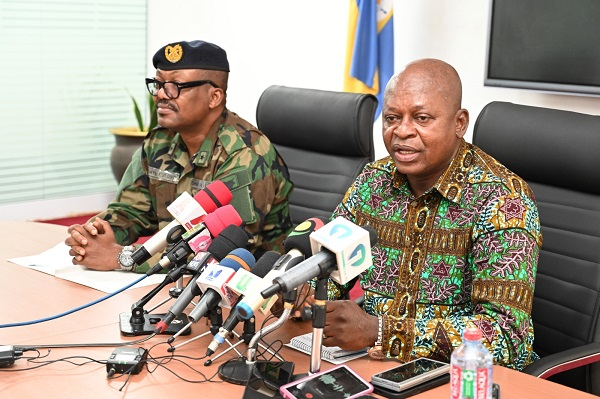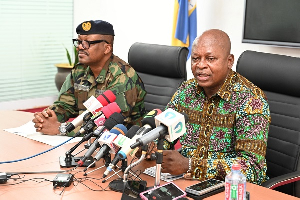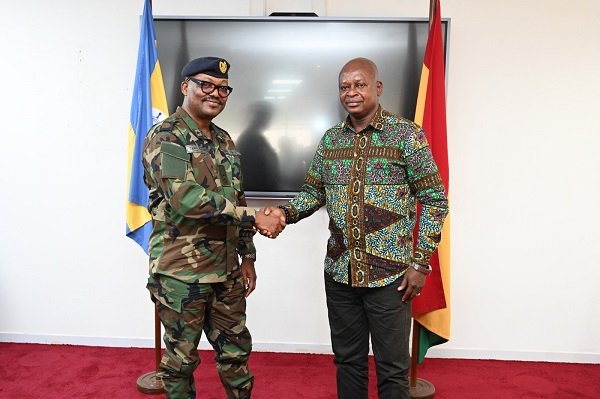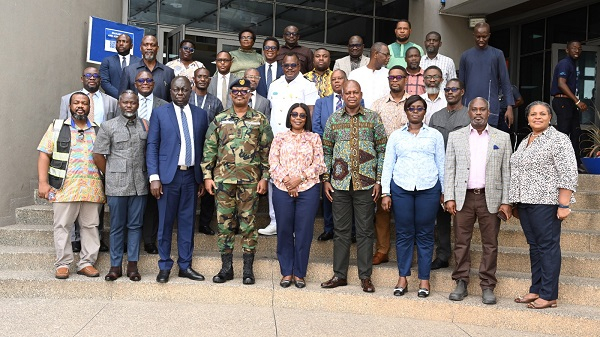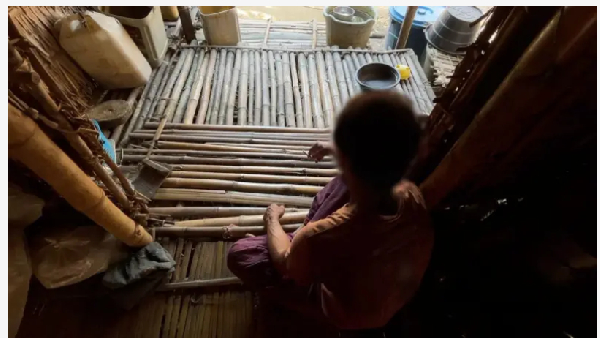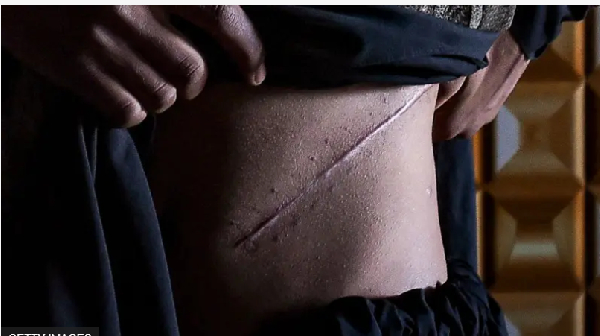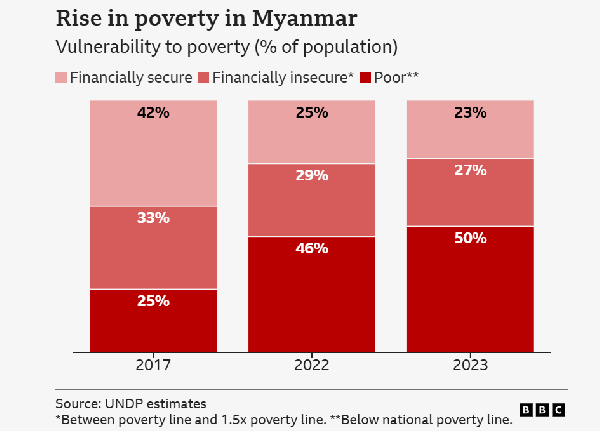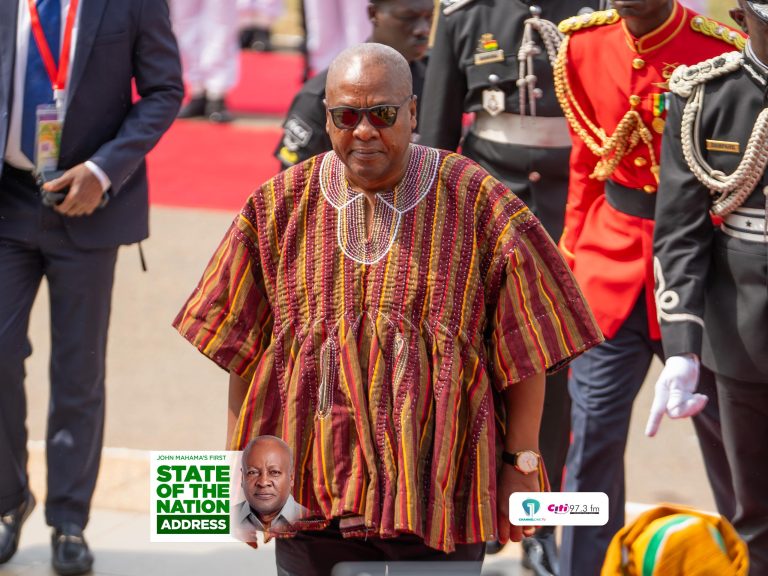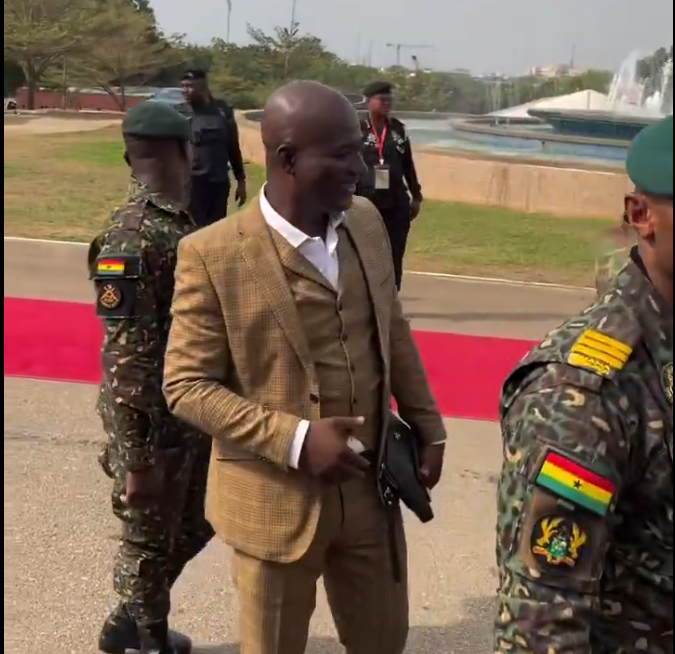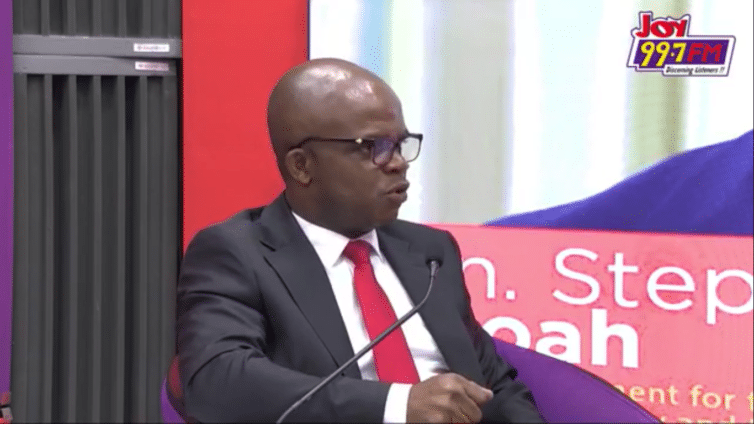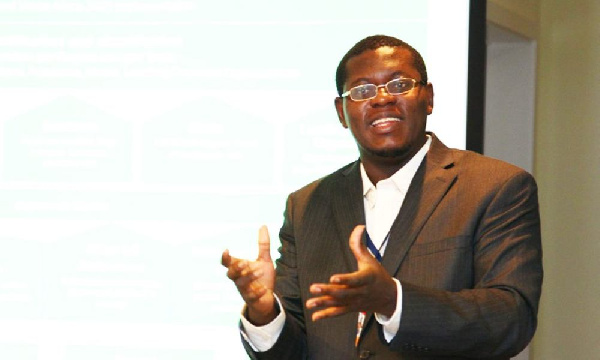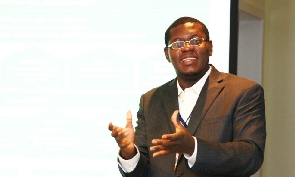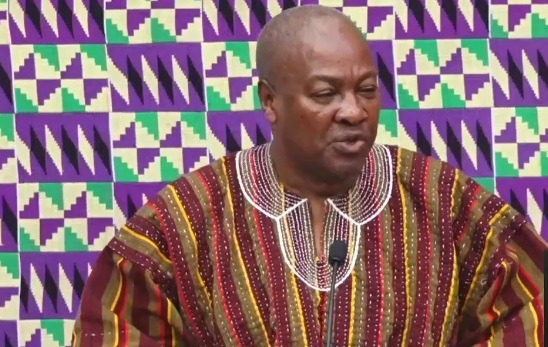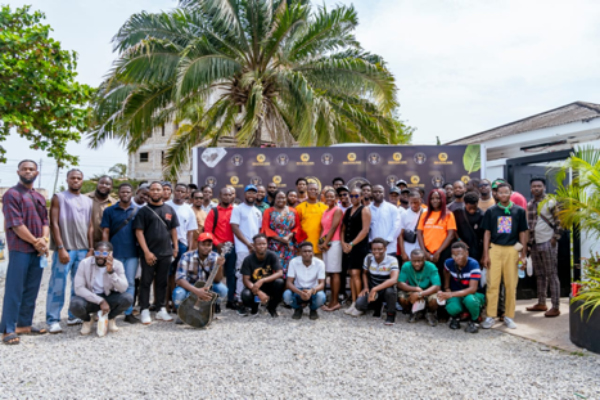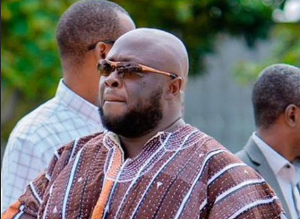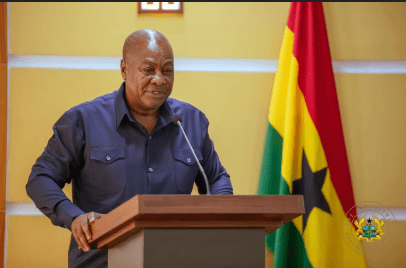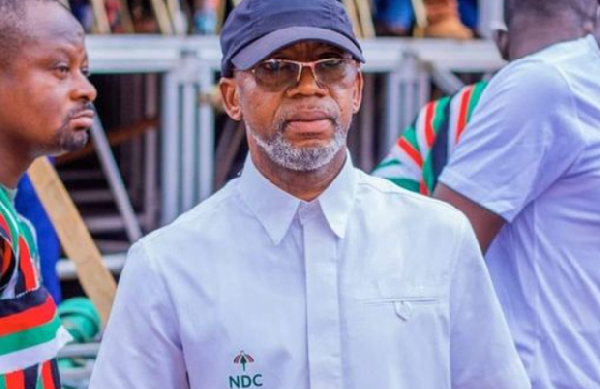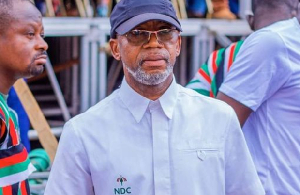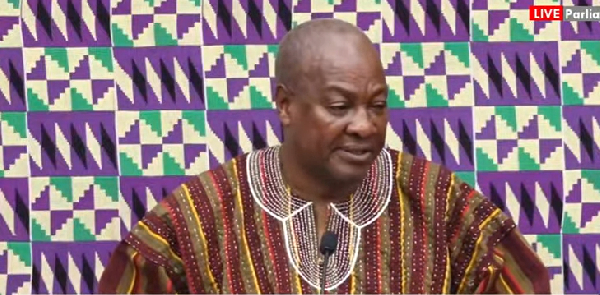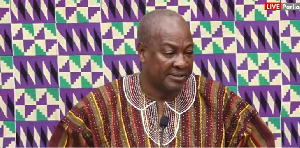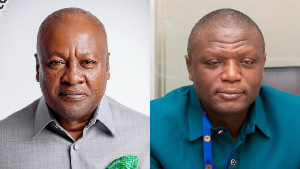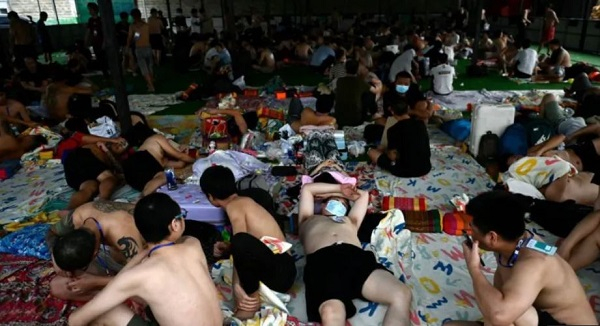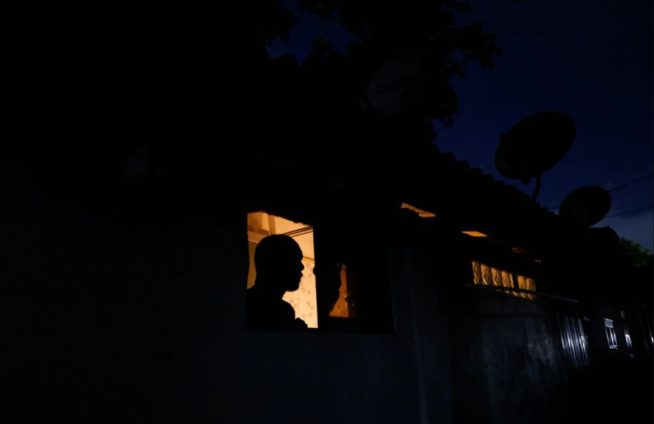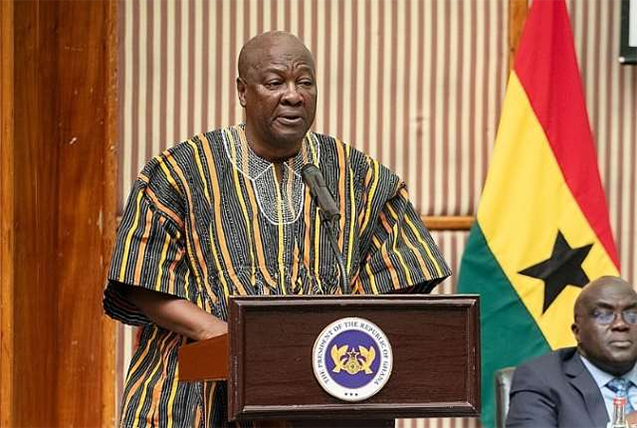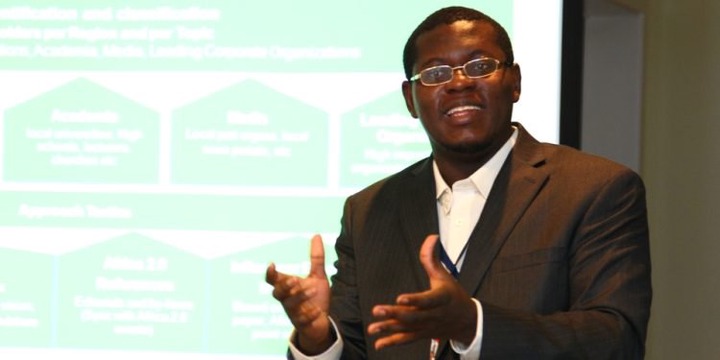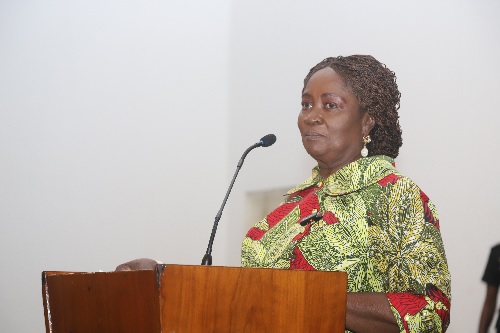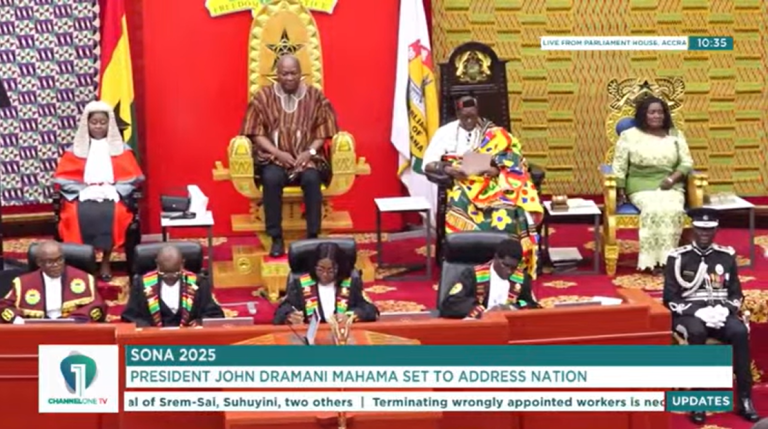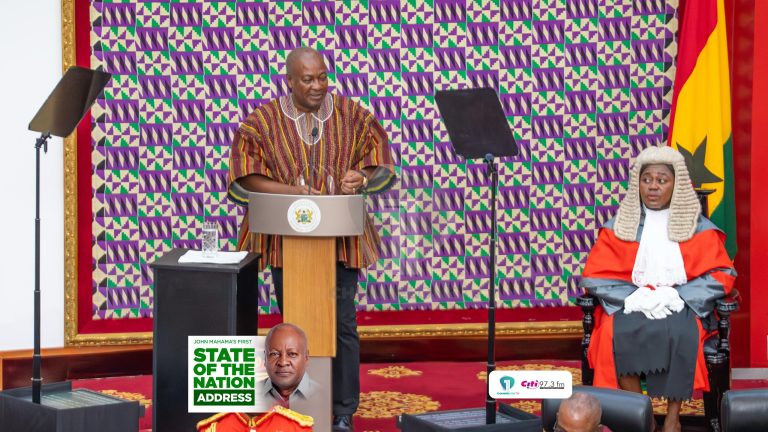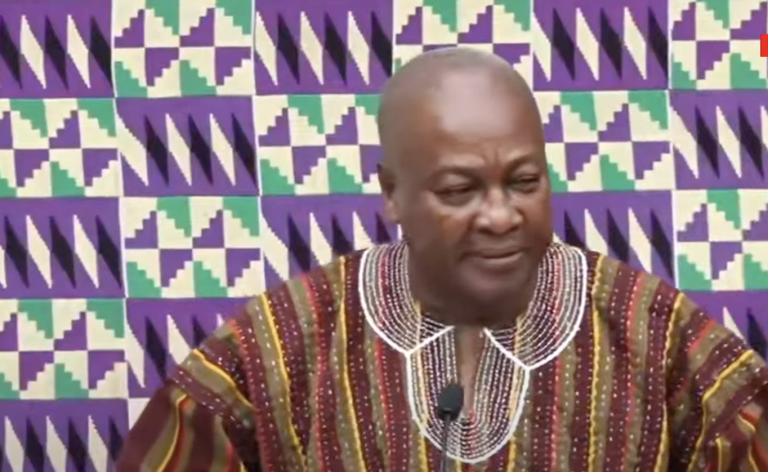President John Dramani today addressed the nation on its state, promising to reset and drive it in the positive.
Among other things he promised to keep paying bondholders and not cancel the teacher trainee allowances. He also pledged to hold accountable all those who have faulted and restore fiscal discipline.
Below is his full speech
MESSAGE ON THE STATE OF THE NATION
DELIVERED BY HE JOHN DRAMANI MAHAMA, PRESIDENT OF THE REPUBLIC OF GHANA TO THE 9TH PARLIAMENT ON THURSDAY, FEBRUARY 27, 2025.
Right Honourable Speaker,
Your Excellency, the Vice President,
Your Excellency, the First Lady,
Your Ladyship, the Chief Justice,
Honourable Members of Parliament,
Honourable Members of the Judiciary,
Distinguished Leaders of Our Security Forces,
Excellences, Members of the Diplomatic Corps,
Our revered Niimei, Naamei, Chiefs, Traditional Rulers and Religious Leaders,
The National Chairman and executives of the National Democratic Congress,
The good people of Ghana,
I wish you a very good morning.
Mr. Speaker, Article 67 of the 1992 Constitution requires the President to address the people of Ghana, in whom sovereignty resides, on the state of the nation.
About thirty (30) years ago, in 1996, I took my first steps in public service when I was elected to this august house as the Member of Parliament for the Bole Bamboi Constituency.
For twelve memorable years, I forged many enduring friendships and alliances while working with colleagues from both sides of the house to shape Ghana’s legislative agenda and advance the development of our beloved country, Ghana.
It has also been nearly a decade since I said goodbye to this house after delivering what many, including myself, thought at the time would be my final address to Parliament.
God almighty, providence and the unpredictability of life have summoned me here once again, on the back of a historic electoral mandate from the people of Ghana, to deliver a message on the State of the Nation.
That mandate came with an unprecedented majority in Parliament, and here I am, once again, to deliver a message on the real State of the Nation.
Mr. Speaker, I wish to convey my heartfelt gratitude to Parliament for the prompt vetting and approval of my nominees for Ministerial positions.
This efficiency is unmatched in the history of the Fourth Republic, demonstrating the strides we can make when we come together in our dedication to serve the people of our great country.
I believe that a similar dispatch will be applied to the approval processes for my Deputy Ministerial nominees. This will enable them to promptly assume office and assist their Ministers in delivering on our noble vision of Resetting Ghana.
In making the nominations and considering the numbers involved, I considered the long-expressed sentiments of the Ghanaian people about the sheer size of previous administrations and the associated cost implications.
I trust that this significant reduction to sixty (60) Ministers and Deputy Ministers, including Regional Ministers—will set the stage for further reductions in the size of future governments.
With the inauguration of the Council of State, we can begin appointing staff for the Presidency. I intend to significantly reduce the number of staff compared to what existed under the previous administration. All this is aimed at leading by example in cutting down government expenditures and reducing the budget deficit.
Let me begin, Mr. Speaker, by invoking the timeless words of hymnist John Oatman Jr., who encourages us to count our blessings and name them one by one.
Yes, we are a nation troubled on many fronts, but we have many blessings, among which is a now firmly established democracy that, for all its imperfections, has enabled four (4) peaceful transfers of power in our land.
Nestled in a sub-region often plagued by strife and political instability, there is good reason to take sober satisfaction that these successive peaceful power transfers have become routine.
Mr. Speaker, fifty days ago, I took the solemn oath to assume leadership of this country and serve with truth and humility. This was preceded a month earlier by watershed elections that promised to revive our nation’s fortunes and give us a new lease on life.
The election result gave us an important opportunity to change course and move off the slippery slopes our country had been descending on that had caused so much economic pain, suffering, and grief.
In their collective wisdom and with resounding clarity, the Ghanaian people chose to chart a new path to reset the country’s economy. Through their votes, they made it clear that they would henceforth demand the highest standards of governance from those they put in positions of leadership.
The good people of Ghana elected me to office, with a historic electoral margin of nearly 1.7 million votes separating me from my next opponent.
For the National Democratic Congress (NDC), that resounding victory is a selfless call to duty from a people weary of years of economic hardships and poor governance.
That call, therefore, places an obligation on me and all who serve with me, including legislators from both sides of the house, to do our utmost with decency and humility to change the circumstances and state of our country.
Mr. Speaker, as I stated earlier, Article 67 of the 1992 Constitution requires that I give an account of the State of our Nation to Parliament. I am sad to report that the state of our nation is not good. Our economy is in crisis, and our people are suffering unprecedented hardships.
Mr. Speaker, we will host a National Economic Dialogue on March 3rd and 4th. On March 11th, the Minister for Finance, on my behalf, will present the budget estimates for the financial year to this August House. These two events will allow us to present the real state of Ghana’s economic crisis to the people.
Mr. Speaker, it is not my style to lament and shift blame when confronted with challenges, as others often do. My approach is to accept challenges and work hard to resolve them. Indeed, that is precisely what the people of Ghana elected me to do.
I have not come here to lament the state of our country, though there is much to lament. I understand why I was elected with such high voter confidence—to solve their problems.
With your permission, Mr Speaker, and within the constraints of time—I will take the liberty to elaborate on how we intend to address the problems.
Yesterday, February 26, 2025, marked exactly ten years since I stood in this chamber, at this very spot, to declare my determination to fix Dumsor, a legacy problem of power shortages. And I fixed it!
Yes, I promised to fix it, and I did! I wish to place firmly on record that from January 2016 until I handed over the administration of this country on January 7, 2017, there was no power rationing or load management in Ghana.
Mr. Speaker, today, inspired by the almighty God and propelled by the massive mandate given me by the good people of Ghana, I am moved to make a similar purposeful and bold declaration. That, I, John Dramani Mahama, will fix the economic crisis confronting our country and reset it on a path of growth and prosperity.
My government, working with you and every Ghanaian, will solve the challenges because we have developed a plan with our people’s support.
When I decided to run for President again, I did so because of what I knew about the state of our country. I was aware that huge problems awaited me upon my assumption of office. But nothing could prepare anyone for the reality of the depths to which our economy and governance have sunk.
Our elders say that a frog’s true length can be ascertained only after it has died. And how right they are.
It is common knowledge that our economy is in dire straits, which is putting it mildly because, after an initial assessment of the books, we have discovered that our economic problems are much deeper than was publicly known. We have inherited a country that is broken on many fronts. The profundities of the challenges are staggering.
We are saddled with staggering debts and glaring signs of almost deliberate and, in some cases, criminal mismanagement of our resources.
Mr. Speaker, not even the restraints of an IMF programme were enough for the previous economic managers to exercise prudence in managing our finances.
After setting an inflation target of 18% by the end of 2024, the actual rate was 23.8%, significantly exceeding the IMF threshold. The Ghana cedi continued its downward slide, losing 19% of its value against the dollar in 2024. It had already lost 27.8% in value in 2023.
In addition to the public debt, which amounts to a staggering GHS 721 billion, several State-Owned Enterprises are also in debt, including ECG, which owes GHS 68 billion.
Ghana Cocoa Board—the hope of cocoa farmers—is also highly indebted. Its balance sheet indicates a total debt of GHS 32.5 billion, of which GHS 9.7 billion is due to be paid at the end of September 2025.
In the 2023/2024 crop season, COCOBOD could not supply three hundred and thirty-three thousand seven hundred and sixty-seven (333,767) tonnes of cocoa, which it sold at US$ 2,600 per tonne. As a result, the then management of COCOBOD rolled over these contracts into the 2024/2025 cocoa season.
This implies that for every tonne of cocoa delivered this year in fulfilment of the rolled-over contracts, COCOBOD and the Ghanaian farmer would lose US$ 4,000 in revenue.
Mr. Speaker, as I address this honourable house, COCOBOD has supplied 210,000 tonnes out of the rolled-over contract, resulting in a revenue loss of US$ 840 million for both COCOBOD and the Ghanaian farmer.
COCOBOD and the Ghanaian farmer will lose another US$495 million when the Board finishes supplying the remaining rolled-over contracts.
Additionally, cocoa road commitments alone total GHS 21.7 billion, of which only GHS 4.4 billion is included in the total debt of GHS 32.5 billion. This debt has arisen mainly because of the decision in 2019 and 2020 to award road contracts worth over US$1 billion because of the election.
Mr. Speaker, the energy sector faces significant financing challenges primarily due to collection and system losses, non-compliance with the Cash Waterfall Mechanism, and legacy debts.
The financing shortfall has risen considerably to approximately US$2.2 billion or GHS 34 billion for 2025, and urgent measures will be needed to reduce it to sustainable levels and ultimately eliminate it.
The financial sector continues to struggle despite the previous government reportedly spending GHS 29.9 billion on the financial sector clean-up exercise to date.
They also left scant reserves for debt servicing despite implementing what may be considered the most severe and distressing economic policy in the annals of the Fourth Republic, if not in the entirety of our nation’s history—the Domestic Debt Exchange Programme.
This is in stark contrast to our actions in 2017, before we left office, when we allocated US$ 250 million to the Sinking Fund to service debt.
While there have been claims that buffers were left for debt repayment, the statement of accounts for the Debt Service Reserve Account, also known as the Sinking Fund, shows a balance of only $64,000 and GHS 143 million in the dollar and Ghana cedi accounts, respectively.
The repercussions of reckless debt accumulation and economic mismanagement will require extensive work and sacrifice to repair.
In the next four years, debt servicing will amount to GHS 280 billion, comprising GHS 150 billion for domestic and GHS 130 billion in external debt servicing.
The catastrophic debt position has also severely impacted infrastructure projects that should have been completed. There are fifty-five (55) stalled projects due to the default of debt and subsequent restructuring, with a total amount of US$ 2.95 billion not disbursed. The stalling of these projects is expected to result in a cost overrun of about GHS 15 billion.
Notwithstanding this gloomy background, I remain committed to leading this government, taking every necessary step to reset our economy, getting things back on track, and working with the good people of our country to build the Ghana we want.
We are doubling our efforts to complete all outstanding structural reforms. Through the budget, we will implement corrective measures to restore fiscal discipline and debt sustainability. We are also working towards completing the upcoming fourth review of the IMF-supported Programme.
The review is scheduled from April 2nd to April 15th, 2025, and the IMF Executive Board is expected to approve it in June 2025. As we have done previously, we are also building buffers in the Sinking Fund and adopting prudent debt management practices to ensure prompt repayment of upcoming domestic and external debt maturities.
In this respect, the government successfully honoured the matured coupon payment of GHS 6.081 billion (in cash) and GHS 3.46 billion (in kind) due in February 2025 to all Domestic Debt Exchange Programme (DDEP) bondholders.
We have also built additional buffers in the Sinking Fund to honour maturing DDEP bonds due in July and August.
With the transparent and prudent measures we have implemented since taking over the administration of this country, I urge my countrymen and women, business owners, and foreign investors to trust our competence in turning our economic fortunes around.
Mr. Speaker, since we took office on January 7, 2025, we have upheld our commitment to a fiscal consolidation agenda with a streamlined government. We have eliminated unnecessary expenditures and reduced our reliance on borrowing.
Our prudent debt management practices have led to a substantial reduction in interest rates.
The 91-day treasury bill rate, which was 28.51% on January 6, 2025, has decreased to 24.48% as of February 24, 2025. Similarly, the 182-day Treasury bill rate, which was 29.07% as of January 6, 2025, has decreased to 25.388%
The 364-day Treasury bill rate has also moved from 30.41% to 27.30% in the same period.
We signed a Memorandum of Understanding (MoU) with our Official Creditor Committee (OCC) to formalise the debt treatment agreed upon with official creditors. This marks a crucial step toward Ghana’s restoration of long-term debt sustainability. The agreement will enable financial resources to support and strengthen economic recovery.
Mr Speaker, on February 20, 2025, the National Tripartite Committee (NTC) and the Public Services Joint Standing Negotiating Committee (PSJSNC) concluded negotiations on the 2025 minimum wage and base pay for the Single Spine Salary Structure (SSS), respectively.
I want to use this opportunity to reiterate my sincere gratitude to Organised Labour and the Ghana Employers Association for their understanding and cooperation in reaching this agreement on the minimum wage and base pay.
On the final day of negotiations, I enjoyed the privilege of joining my comrades, the leaders of organised labour, for the concluding discussions. I am confident that the sacrifice we all have to make this year will significantly benefit our economy’s health.
We look forward to a positive economic outlook as we restore macroeconomic stability, encourage exports, activate the 24-Hour Economy initiative, implement the US$ 10 billion ‘Big Push’ policy for swift infrastructure development, ationalize taxes, and foster inclusive growth.
The goal is prosperity for all, which must be shared, not the prerogative of a select few.
Mr Speaker, in fulfilment of our 120-day social contract with the Ghanaian people, we have put in place the planning committee to host the National Economic Dialogue. This dialogue is expected to discuss the State of the economy and reach a consensus on the key policies needed to address the devastating economic crisis confronting us.
It will support the development of a home-grown fiscal consolidation programme and highlight key structural reforms and policy priorities essential for resetting the economy and creating prosperity for all.
I believe there is absolute wisdom in what our elders say: that two heads are better than one. Consultation and consensus building have always proven to be better than unilateral decision making. It is my hope that our colleagues on the other side of the divide will display love of country and participate in this National dialogue unlike their boycott of the Senchi Forum in 2014.
I humbly choose a different path of accommodation and cooperation with all stakeholders. We will continuously engage on important issues so that together, we can reset our country and focus on sustainable development. Together, we shall build the Ghana we want.
Mr. Speaker, my administration inherited an energy sector on the brink of collapse, which was weighed down by unsustainable debts. This unfortunate situation has led to many Independent Power Producers (IPPs) and fuel suppliers threatening to cease their operations.
Despite collecting over GHS 45 billion in Energy Sector Levies (ESLA) over the last eight years, the outgone NPP administration has left the Ghanaian people an energy sector burdened with a staggering GHS 70 billion debt as of December 2024.
It is of deep concern that several state-owned enterprises (SOEs) in the energy sector are struggling to stay afloat. Unless urgent interventions are made, many of them will go under.
Financial distress in the energy sector remains a significant obstacle to delivering consistent and affordable electricity to Ghanaians and poses an existential threat to the economy in general.
Compounding these challenges, critical maintenance activities—such as the scheduled pigging of the West African Gas Pipeline (WAPCO)—were postponed from 2024 to 2025 without sufficient contingency measures for alternative fuel supply.
As a result, my administration has had to swiftly mobilise resources to secure emergency fuel supplies, ensuring that electricity generation continues despite the difficult circumstances.
I have been informed that the pigging exercise will be completed in the first weeks of March. Once additional gas flows from Nigeria, we anticipate a marked improvement in the power situation.
While the current state of the energy sector poses grave concerns, we must remain resolute in our commitment to restoring stability. I have directed the Minister for Energy and Green Transitions to implement far-reaching reforms, including enforcing a single revenue collection account, strictly adhering to the Cash Waterfall Mechanism (CWM), and eliminating wasteful expenditures.
The Minister, following my directive has set up an advisory committee to guide the participation of the private sector in metering and billing in order to improve efficiency in revenue collection and reduce the high commercial and technical losses that are threatening to drown the state-owned utility company.
A pilot partnership between ECG and Enclave power has proved highly successful and provides us with a workable framework. ECG provides bulk supply of power to Enclave Power Limited. Enclave Power provides meters and bills all companies operating in the Free Zones Enclave with 99% revenue collection and nearly 100% uptime in power supply.
Reduction in commercial and technical losses will lead to affordable tariffs for everyone and bring relief to all users of electric power. We also aim in the medium term to achieve 100% gas utilisation for power production and eliminate the use of crude oil.
This will save Ghana hundreds of millions of dollars spent on the importation of fuel oils for power production.
With regards to renewable energy, this administration will soon operationalise a Renewable Energy and Green Transition Fund to enhance efficiency and accelerate Ghana’s transition to renewable energy.
This initiative will drive investment in sustainable energy solutions, including solar street lighting, rooftop solar installations, off-grid solar systems, electric vehicle charging stations, and chargeable outboard motors. These measures will reduce dependence on the national grid and position Ghana as a leader in Africa’s green energy transition.
Mr. Speaker, Ghana’s petroleum sector has witnessed a precipitous decline, with crude oil production shrinking by more than 32%. This has resulted from high opacity levels, a hostile business climate, and excessive political interference, culminating in most major oil companies exiting and stalling upstream activities.
The decline in upstream activity is obvious to any person familiar with the twin cities of Sekondi-Takoradi. Just under a decade ago, the twin cities were the bustling epicentre of fabrication, logistics, and service activity associated with the upstream oil and gas sector. Unfortunately, my recent visit reveals many shut down facilities and many businesses that have packed and left.
Hundreds of workers have been laid off and left unemployed. I wish to assure the people of Sekondi-Takoradi and indeed the whole Western Region that we will breathe life back into the area.
We have commenced revitalisation of our upstream petroleum sector by creating a business-friendly and congenial environment for our partners and other prospective investors. My meetings with players in the upstream sector has been extremely positive and we have been assured of substantial investments running into billions of dollars in the very near future.
Mr Speaker, Ghana has fertile lands, abundant water, and human resources. Yet, we face a paradox. Our food import bill continues to soar, reaching alarming levels of over US$2 billion annually. In addition, rising food inflation is burdening households and threatening livelihoods.
To address this, we are implementing several well-considered policies to grow the agricultural sector, including agro-processing. This will be backed by a reliable power supply, to meet our country’s needs while advancing exports to earn foreign exchange and strengthen our economy.
The Agriculture for Economic Transformation Agenda (AETA) will modernise agriculture, enhance agribusiness, ensure food security, lower food inflation, boost exports, and create sustainable jobs.
The Feed Ghana Programme will increase food production and reduce prices through projects like the Grains Development Project, focusing on rice, maize, and soybean production. The Vegetable Development Project will target crops such as tomatoes, onion, and pepper.
Our poultry farm-to-table project will eliminate poultry imports and increase local production. Ghana imports 95% of its poultry needs, which costs over US$ 300 million annually. To reverse this trend, government’s plan is to revamp the poultry sector by investing in hatcheries, feed mills, processing, and distribution, working toward eliminating poultry imports.
The Nkoko nkitinkiti project will cover fifty-five thousand (55,000) households producing eggs and fresh poultry for the market and help reduce the $300 million dollars we spend on importing chicken annually.
To strengthen the connection between agriculture and industry, we will prioritise value addition, processing, and distribution. This will position agriculture as a profitable and appealing activity, making it more attractive to young people.
We will implement an AgriNext Programme to facilitate access to land banks by young farmers, connect graduates with opportunities in the agricultural value chain, and promote greenhouse agriculture among the youth. This initiative will benefit approximately 30,000 young people.
Mr Speaker, the Livestock Development Project will address Ghana’s reliance on imported meat by restocking breeder farms and increasing local livestock production, creating jobs and boosting self-sufficiency.
For years, access to mechanisation, quality seeds, fertilisers, and extension services has been a major challenge for farmers. To address this, government will establish Farmer Service Centres in every agricultural district, ensuring farmers receive essential resources to improve productivity and efficiency.
In the fisheries sector, we will implement strategic interventions to enhance productivity and sustainability. Key among these initiatives is the continued enforcement of measures to curb illegal, unreported, and unregulated (IUU) fishing, which threatens marine biodiversity and the livelihoods of our hardworking fisherfolk.
We have intensified surveillance and monitoring operations, bolstered by the deployment of modern technology and strengthened collaboration with key stakeholders.
In the last month, we have expanded the supply of subsidised premix fuel to support artisanal and industrial fishers, ensuring affordability and availability. We will also invest further in modern fish landing sites and cold storage facilities to improve post-harvest handling, reduce losses, and enhance the quality of fish products.
Aquaculture development is a key focus of our administration. We will provide financial and technical support to fish farmers, increasing local fish production and reducing our dependence on fish imports.
To increase value addition in the sector, we will encourage the establishment of fish processing facilities, create more jobs and boost exports. Our commitment to supporting women in fisheries remains steadfast as we implement programmes to empower female fish processors and traders with financial resources and capacity-building initiatives.
While we work hard to fix the economy, and provide job opportunities in all sectors, including agribusiness, one of the biggest crisis we face is youth unemployment.
Youth unemployment has led to despair and frustration. The latest estimates show that up to two million youth are unemployed. This poses a major security risk for our country and requires urgent attention.
To bring much-needed focus to the desperate and widely scattered youth employment programmes and ensure stricter accountability in their implementation, I have set up the Ministry for Youth Development and Empowerment in furtherance of my campaign promise.
The Ministry is mandated to formulate, coordinate and monitor policies and programmes to promote youth development and empowerment in the country.
Mr Speaker, as part of our Operation Recover All Loot policy, I have already tasked our investigative bodies to bring the culprits of the National Service ghost names scandal to justice. Such brazen theft of public funds must be stopped and punished.
It is estimated that the criminal addition at some point of more than eighty thousand (80,000) ghost names could have yielded the suspects over GHS 50 million a month. Unfortunately, some of the suspects are believed to have absconded from the country. I have directed that they be declared wanted and their assets traced and frozen until investigations are completed.
To achieve a legally robust regime to govern National Service, I have also tasked the Minister for Youth Development and Empowerment to coordinate and present to Parliament a Legislative Instrument (LI) to support the implementation of the newly passed National Service Authority Act 2024 (Act 1119).
We will introduce short military training as part of our national service scheme. This will instill a sense of fitness and discipline into our youth.
The administration of scholarships is another challenge. It has been fraught with many challenges. The poor who genuinely need scholarships are unable to access them because the rich always crowd them out.
To fulfil my government’s vision of promoting transparency, equity, and sustainability in the scholarship scheme, we shall streamline the award process to ensure that only deserving youth benefit from the system. We shall introduce increased transparency, including publishing the list of beneficiaries every year.
Mr Speaker, job creation is one of the main pillars of my government’s promise to the youth of Ghana. To help actualise this promise, we will roll out the Adwumawura Programme. This initiative will create, track, and mentor businesses annually, with a special focus on young people.
For the first phase, the top two thousand (2,000) implementable business proposals will be supported with business development training, mentorship, access to startup capital, market and networking to operationalise their innovations and business ideas.
Government will also launch our flagship National Apprenticeship Programme to equip ten thousand (10,000) young people in the informal sector with employable skills, including providing apprenticeship fees and start-up kits.
The youth development and the interior ministries will facilitate training for young people in the okada business in areas such as road safety regulations, financial literacy, and digital skills, as well as facilitate the acquisition of motorbikes.
We will introduce electric motorcycles on a hire purchase scheme to eliminate the use of petrol and make the business more profitable.
Her Excellency the Vice-President’s Empowerment for Women and People with Disabilities Programme will also be launched this year. The programme will target women, people with disabilities, and other vulnerable groups to build their capacity and offer them access to finance to create jobs.
Mr. Speaker, the Ministry of Communications, Digital Technology, and Innovations will also focus on developing youth IT skills and fostering innovation. Under the ‘One Million Coders Programme’, young people will receive training in coding, web app development, digital marketing, and other digital skills. This initiative aims to equip them with the necessary skills for employability in the digital ecosystem.
We must provide meaningful and relevant education to prepare our youth for today’s technology-driven job market. Despite various reforms, issues related to low learning outcomes persist within Ghana’s educational system. I am committed to ensuring that quality education remains a top priority.
The system we inherited is outdated in many ways and must be realigned to meet the needs of the 21st century and the Fourth Industrial Revolution.
Recognising the urgent need for national dialogue on education and in the spirit of inclusive governance, I launched the National Education Consultative Forum on February 18 in Ho. I look forward to the recommendations, which we will incorporate into our sectoral policies.
Mr Speaker, even though Article 38 of the Constitution guarantees equitable access to education across Ghana, 30 years after the Free Compulsory Universal Basic Education (FCUBE) programme, its full objectives remain unmet.
To tackle this issue, government will redefine the scope of basic education and introduce the “Zero to Hero” initiative to enhance foundational literacy and numeracy.
Additionally, ICT training will be integrated into early childhood education. Over the next three years, it will be expanded to cover 300 classrooms, 30 centres of excellence, 1,000 teachers, and District Teacher Support Teams (DTSTs) focusing on mathematics and literacy.
This year, the Ministry of Education will fully implement a new curriculum for Senior High Technical Schools and STEM Schools, introduce a standardised National Sign Language for hearing-impaired learners from Kindergarten to SHS, and review the Kindergarten and Primary School curriculums.
To increase access to quality education, we will scale up social intervention programmes like Capitation Grants, Feeding Grants for Special Schools, and the government’s BECE registration initiative.
To promote inclusion and equity, the government will:
Enhance and resource the Islamic Education Unit to recruit more Islamic and Arabic tutors; Establish STEM and TVET schools in underserved peri-urban communities; Provide scholarships to brilliant but needy students in deprived communities, especially for law, medicine, and engineering; Support Islamic Colleges of Education with infrastructure and logistics; Enrol youth in Zongo and deprived urban areas in the National Apprenticeship Programme and offer free technical and vocational training.
It is important to continue to retain and motivate teachers in all schools, especially in rural and underserved areas. Government will begin plans for the implementation of the 20% allowance for teachers who agree to serve in rural schools.
District Assemblies would be involved in this scheme to ensure that the teachers are present and teaching. This scheme will reward such teachers for their sacrifice and ensuring quality education nationwide.
As part of our Teacher Dabr3 initiative, the construction of teacher accommodation units to improve welfare and attract teachers to rural areas will commence this year.
Mr Speaker, once again for emphasis, and for the record, I, John Dramani Mahama, President of the Republic of Ghana, will not cancel the free SHS programme. I am determined to make it better by improving its implementation.
Also, for the record, students who have benefitted from the free SHS since its inception are about 3.4 million. The figure of 5.1 million beneficiaries, as previously put out by the Akufo-Addo government, was an exaggerated and false narrative calculated to achieve political credit.
While it has improved access, the implementation of free SHS leaves much to be desired. The outcomes of the ongoing National Education Forum will guide our reforms in this sector.
In line with our promise, the Minister for Education has announced the restoration of Parent-Teacher Associations (PTAs). It is important for parents and communities to participate in the administration of their schools. The Ministry of Education and GES will ensure that PTAs do not impose unbearable financial burdens on parents and students who cannot afford them.
The double-track system remains a challenge, and we are committed to eliminating it by accelerating school infrastructure expansion and completing stalled projects. To fund this, the Education and Finance Ministries are working to uncap the GETFund for secondary school projects.
As promised, we have begun improving secondary school feeding. Efforts to decentralise food management include strengthening procurement and store management capacity. Once completed, food procurement and management will be fully handed over to secondary school heads.
Science, Technology, Engineering, and Mathematics (STEM) are central to national development. We will expand STEM programmes at all levels to equip students for the global economy. Regional TVET Centres of Excellence will be established to provide practical skills.
Ghana has consistently missed its Gross Tertiary Enrolment targets, with the rate below 22%—far from the 40% goal by 2030. Despite over 460,000 secondary graduates annually, 55% qualify for tertiary education, and only 35% (161,000) enrol, leaving over 300,000 without access.
To address this, government is introducing a no-fee stress policy to eliminate tertiary admission fees, which currently serve as a barrier to higher education for some students.
This will be supported by an enhanced Student Loan Scheme (Student Loan Plus). The no-fee policy will also cover all Persons with Disabilities (PwD) who gain admission to tertiary institutions. Additionally, TVET enrolment will be increased from 11% to 20% to boost employability.
Rising enrolment has strained university infrastructure, causing overcrowding and inadequate accommodation. We are determined to expand access, improve quality, and align tertiary education with national goals, particularly in STEM.
Feasibility studies for new public universities or campuses of existing universities to be established in the six new regions will commence this year.
Seed funding for these projects will come from the GETFund to enhance nationwide access.
Government will engage with the existing public universities to identify suitable sites on their acquired lands for the implementation of the private sector participation in the provision of hostels. This will allow more students to be accommodated on the campuses to allow for a better learning environment.
Academic freedom will be upheld, and institutions will be required to ensure good governance.
Mr. Speaker, the health sector faces significant challenges that jeopardize the very foundation of our health system. The Ministry of Health has a total liability of nearly GHS 15 billion when co-financing obligations, judgment debts, and payments to clear medical commodities at the ports are put together.
The last major hospital equipment replacement programme was undertaken in 2014 when I was President. Since then, most hospital equipment in GHS facilities have deteriorated or broken down.
The Agenda 111 programme started as a knee-jerk reaction during the COVID-19 pandemic when the Ghanaian public began to appreciate the significant investment the previous NDC administration had made in health facilities and lament the many hospital projects that had stalled under the Akufo Addo administration.
The promise was to build 111 hospitals, but no dedicated funding source was secured for such a gargantuan project.
Mr. Speaker, for the record, as I speak, not a single Agenda 111 hospital is operational in any part of Ghana. It is worth disclosing that US $400 million has already been disbursed under Agenda 111 project. At a rate of approximately $18m per hospital, the US$ 400 million spent could have completed at least 22 hospitals for Ghanaians. We will now require GHS 22 billion to complete the projects.
I have tasked the Minister for Health to present a plan on the way forward for this programme. Let me add that we are open to public-private partnerships and franchising to complete and operationalise these hospitals.
Mr. Speaker, one of the most pressing issues confronting our health sector is USAID’s sudden 90-day pause in services without prior notice and the looming threat of complete withdrawal of programmes that do not align with the USA’s strategic interests.
Programmes that this will affect include the delivery of medical commodities to regional medical stores and health facilities in the Upper West, Upper East, Northern, and Savannah regions.
USAID’s support for the National HIV/AIDS Control Programme, including the supply of antiretroviral therapies (ARTs) in the Western, Western North, and Ahafo Regions is also affected.
This withdrawal puts at risk approximately $78 million earmarked for malaria, maternal and child health, nutrition, and HIV/AIDS programmes.
The impact will be devastating without urgent intervention. I have therefore directed the Minister for Finance to make immediate financial arrangements to mitigate this loss, and I expect that this will be reflected in his budget, which will be presented next month.
Working with the NHIA, we will revive the ONUADOR mobile healthcare vans to provide OPD, ophthalmology, dental, ENT, and cancer screening care in remote and vulnerable communities. An earlier attempt to provide mobile healthcare facilities was abandoned after the change of government in 2017.
Mr. Speaker, public health experts are grappling with the conundrum of new diseases and the re-emergence of old diseases. The unpredictable nature of disease outbreaks suggests we must make our health system resilient to shocks.
Since October last year, Ghana has faced a severe cholera outbreak. As of February 17, 2025, 6,300 suspected cases, 545 confirmed cases, and 49 deaths had been recorded.
The outbreak has affected 118 districts across Greater Accra, Central, Western, Ashanti, and Eastern Regions. To control the situation, we have launched an aggressive vaccination and public education campaign, among other interventions.
Mr Speaker, sanitation within the context of infectious disease outbreaks, personal hygiene and environmental sanitation must be a major priority. Our cities and towns must be cleaner than what is being delivered so far.
We commit to right the wrongs to keep our communities and cities clean through appropriate investments, supervision, and performance tracking.
Mr. Speaker, the Upper West Region is facing a severe meningitis outbreak. As of February 17, 2025, 135 suspected cases, 22 confirmed cases, and 16 deaths had been reported across ten (10) districts.
We have instituted free treatment for affected persons and deployed a national team of health experts to encourage early reporting to health facilities.
Mr Speaker, as outlined in the 2024 Manifesto of the NDC, my administration is actively developing the framework for the rollout of the Free Primary Healthcare Programme. When fully implemented, this initiative will mark a significant step towards achieving Goal 3.8 (universal health coverage) of the SDGs by eliminating financial barriers to basic healthcare access.
Also, in line with our 120-day manifesto commitment, the composition of the technical committee is far advanced, with plans to establish the Ghana Medical Trust Fund (MahamaCare) in the coming weeks.
This fund will be dedicated to financing the treatment of non-communicable diseases (NCDs), which have seen a significant rise over the past decade. As part of this initiative, the government is committing to allocating financial resources towards this project in 2025, with further support to be mobilised from private sector partners to ensure the sustainability of the fund.
Once operational, the Ghana Medical Trust Fund will directly address the financial burden of patients requiring dialysis treatment, cancer care, and other critical NCD-related interventions.
Together, the Free Primary Healthcare Programme—which will focus on prevention, early detection, and treatment—and MahamaCare, which will focus on relieving the financial burden of treating Non-Communicable Diseases, will help revolutionise Ghana’s healthcare system by improving healthcare accessibility and outcomes and enhancing productivity and well-being across the country.
Mr. Speaker, as a Social Democrat, I am resolutely committed to eradicating all forms of discrimination in our society. Our vision is to foster fairness and cultivate an inclusive environment where everyone can engage fully and equally in social, economic, and political life.
With my Vice President, Prof. Naana Jane Opoku-Agyemang, we will engage with all stakeholders, including development partners and civil society organisations, to prioritise gender equality, equity, and social justice. We will establish strong social protection mechanisms and enhance legal safeguards for women, girls, and other vulnerable groups.
Our initiatives will include enacting comprehensive laws and policies designed to dismantle harmful social norms, enhance access to crucial resources and opportunities—particularly for young women—and reduce overall vulnerability within our society.
Mr. Speaker, I would like to take a moment to commend you for your unwavering support and guidance, which were instrumental in passing the Affirmative Action Act, 2024 (Act 1121) during the 8th Parliament of the Fourth Republic.
My government is dedicated to successfully implementing the Affirmative Action Act of 2024 (Act 1121) to ensure gender equity across political, social, economic, educational, and cultural spheres.
The Ministry of Gender, Children, and Social Protection is actively collaborating with relevant stakeholders to guarantee that this Act is fully operational, including attaining the 30% target quota for women in political appointments.
I am pleased to report that women currently make up 23.21% of all appointments, and we are diligently working toward reaching the target set forth in Act 1121.
I am concerned about achieving gender balance, especially at the local government level. Very few women muster the courage to apply for the position of MMDCE.
The few who do are edged out on very flimsy and parochial grounds. It is my hope that the National Constitution Review Conference will clear a pathway for the election of DCEs. The Gender Ministry will have the obligation to encourage and support more women to apply for these positions.
In our pursuit of empowering women, Mr Speaker, we will establish the Women’s Development Bank, a specialised financial institution designed to support businesses owned and led by women through low-interest loans and tailored financial services offered under flexible terms.
Consultative processes are underway to ensure the successful launch of this bank. As part of our 120-day social contract, the Minister for Finance will allocate initial funding for the Women’s Development Bank in the upcoming Budget presentation.
We are also implementing measures to expand the Livelihood Empowerment Against Poverty (LEAP) Programme under our “Big LEAP” initiative. As we work towards completing the Ghana National Household Data Census by 2025, we will reassess the status of LEAP beneficiary households to facilitate the enrolment of new beneficiaries.
Mr. Speaker, we are committed to enhancing the legal framework surrounding disability rights by passing the Persons with Disability (Amendment) Bill. Additionally, we will introduce a Legislative Instrument to strengthen further the provisions of the Persons with Disability Act of 2006 (Act 715).
I want to reiterate our commitment to ensuring that individuals with disabilities have access to free tertiary education and equal opportunities to pursue their academic and professional ambitions.
The government intends to ensure the implementation of the legislation that enjoins public and private employers to reserve 5% of their employment for persons with disabilities.
Mr Speaker, Ghana’s sports sector, once a shining example of excellence within Africa, now finds itself at a critical juncture. Historically, our nation has celebrated remarkable achievements in boxing, football, and athletics.
However, recent years have unveiled pressing structural deficiencies in administration, funding, infrastructure, and talent development.
Immediate and comprehensive reforms are imperative to reclaim our rightful place on the global sports stage.
We will develop a comprehensive National Sports Policy to align with international norms. This policy will be accompanied by an exhaustive review of the Sports Act of 2016 (Act 934) and the rigorous enforcement of the Sports Regulations 2023 (LI 2477).
Infrastructure development remains paramount in our strategy. The government is committed to refurbishing existing national stadiums, completing youth resource centres, and constructing new sports facilities in underserved regions. We will also prioritise community recreational facilities to foster greater participation in sports at the grassroots level.
Recognising the critical role of youth development, we are implementing a significant overhaul of grassroots sports with the establishment of the School Sports Authority. This body will oversee structured inter-school competitions and talent identification initiatives essential for nurturing future sporting champions. Over 60% of Ghana’s elite athletes have emerged from these school sports programmes.
The ministry has now been renamed the Ministry of Sports and Recreation. To acknowledge the significance of recreation, we will launch a National Recreation Day—a monthly initiative centred on community engagement—alongside an annual National Recreation Festival. These initiatives will encourage keep-fit activities and promote active lifestyles, promote traditional games, and strengthen community bonds.
Next month, the senior national team, the Black Stars, now a pale shadow of its former glory, will play two World Cup qualifying matches. I have instructed my Office and the Minister to hold the Ghana Football Association accountable to the people of Ghana as we prepare for these games, especially regarding the budget the FA has presented for the two matches.
There will be no secrecy in how much the government spends on the national teams. The budgets presented by the FA and other sports associations must be known by the public. After all, it is the taxpayer’s funds that are used to fund these activities.
The reduction in government expenditure and waste reduction apply to all sectors of the economy, including the Ministry of Sports and Recreation.
Mr. Speaker, Tourism, Culture, and Creative Arts remain vital cornerstones of our national development strategy, playing a significant role in job creation, cultural exchange, and economic growth.
In recent years, the ministry has launched transformative initiatives to position Ghana as a premier global destination. These initiatives aim to harness the country’s rich cultural heritage, natural beauty, and dynamic creative sector.
Our flagship initiative, ‘THE BLACK STAR EXPERIENCE,’ aims to establish Ghana as the gateway to Africa for the global diaspora, featuring thoughtfully curated cultural, historical, and creative arts experiences in collaboration with the private sector, diplomatic missions, ministries, departments, and agencies.
Our aim is to position the Black Star Experience as a uniquely Ghanaian Tourism brand. The Pan African Month will be a part of the Black Star Experience.
It will include street carnivals, film week, a Fashion festival, a food fair, theatrical and drama performances, concert party competitions, and monthly domestic tourism destinations.
We will strategically promote Meetings, Incentives, Conferences, and Exhibitions (MICE) tourism to diversify our tourism offerings.
Ghana’s peaceful and democratic environment positions us as an attractive hub for international summits, business conventions, and high-profile gatherings.
We must capitalise on this unique advantage to maximise our benefits and strengthen our reputation as the Centre of the World.
We are also committed to revitalising the Accra Marine Drive Project, a significant urban redevelopment initiative designed to transform approximately 241 acres of Accra’s coastline into a vibrant tourism and economic hub.
Although the Cabinet approved this vital project during my presidency in 2016, progress stalled under the previous administration. We will reassess the work completed and take decisive action to bring this important project back on track.
We will develop the Osu Castle, the former seat of Government, and the area surrounding it as a tourist attraction, a pedestrian precinct, with arts and craft markets, and a jewellery and gold market.
Mr. Speaker, our road network is the cornerstone of our nation’s infrastructure, facilitating over 90% of the transportation of goods and services across the country.
This vital network is critical in supporting agricultural growth by linking farmers to markets, lowering transportation costs and ensuring quicker access to essential supplies and services.
The resulting interconnected benefits foster a vibrant economy and enhance the livelihoods of countless Ghanaians.
While the previous government has made lofty claims about achieving “unprecedented milestones” in the road sector, available evidence does not support its assertion that it constructed over 13,000 kilometres of new roads.
Instead, it has perpetuated a narrative that presents road maintenance and rehabilitation efforts as new construction projects, misleading the public about its accomplishments.
The proportion of poor roads has increased, especially in urban areas, where the number of roads in disrepair surged from 46% in 2015 to 57% by 2021.
Therefore, the road sector is in crisis, mainly due to years of mismanagement. As many as 85% of awarded contracts have been stalled, and contractors have stopped work due to non-payment.
As of December 2024, unpaid bills owed to contractors exceeded GHS 20 billion for work carried out between 2018 and 2024.
For instance, the Ghana Road Fund obtained a loan of GHS 600 million in March 2018 to refinance outstanding debts and borrowed an additional GHS 1.2 billion from a syndicate of banks in November 2019.
Alarmingly, upon assuming office, the Ghana Road Fund still had outstanding payments—including some as low as GHS 2,000—dating back to 2018. Current commitments for road projects now total an astonishing GHS 105 billion.
Despite these considerable challenges, this government remains steadfast in its commitment to prioritise vital infrastructure projects that address the pressing backlog of poor roads.
Our strategy will be anchored in executing flagship initiatives under the “Big Push” Programme. The Big Push will see major rehabilitation of many key roads in the feeder roads, urban roads and Highway sectors.
We will also undertake the following key initiatives to revitalise the road sector:
– Reintroduce tolls using modern technology,
– Rationalise the Road Sector Portfolio to focus on high-impact initiatives,
– De-cap the Road Fund,
– Minimise sole-source procurement to encourage competitive bidding and enhance public transparency in procurement processes.
The DRIP equipment acquired at the last moment as a knee-jerk reaction for electioneering purposes will be reorganised into Regional mobile maintenance units to provide emergency road works in the regions.
Mr. Speaker, I have realigned the Ministry of Transport to oversee four modes of transport: Aviation, Maritime and Inland Water Transport, Road Transport, and Railways.
The government will commission a feasibility study to develop coastal water transport services. This initiative aims to promote alternative modes of transport and ensure their integration with existing systems under the National Transport Policy. It also aims to enhance tourism, reduce road traffic, and mitigate environmental pollution.
Motorcycles and tricycles, commonly known as “Okada,” hold significant potential as a more convenient, timely, safe, and cost-effective mode of transportation. Currently, the Road Traffic Regulations of 2012 (L.I. 2180) prohibit licensing motorcycles and tricycles for fare-paying passengers.
As part of our Government Policy, the Ministry will amend the regulatory framework to regularise their use for commercial passenger transport.
In our ongoing efforts to revitalise the Ho Airport, the government will facilitate the establishment of a state-of-the-art pilot training academy and a Maintenance, Repair, and Overhaul (MRO) facility.
The Volta Region will become a centre of excellence for aviation training and aircraft maintenance. This project will create significant employment opportunities, stimulate economic growth, and bolster tourism in Ho and the surrounding communities.
With the completion of the Tema-Mpakadan rail line, the government will launch passenger services between Tema and Adome. We will also begin developing the necessary infrastructure on Volta Lake to facilitate freight transport between Tema Port and Buipe as part of our Eastern Corridor multi-modal transport system.
The Western Railway Line will continue to be modernised in partnership with the private sector. This initiative aims to support the efficient transport of bulk cargo and minerals from the mines in Nsuta, Awaso, and Nyinahin to the Takoradi Port while providing passenger transport along the Western corridor.
The last attempt by the previous administration to re-establish a National Airline has failed. We will reopen a transparent expression of interest to invite competent, established partners to work with us to establish a national airline.
We believe that an efficient national carrier can help reduce fares on routes where external carriers are currently enjoying a monopoly.
Mr. Speaker, our Communication and Digital Technology initiatives focus on expanding our national digital infrastructure to stimulate innovation and enhance public service delivery.
We are also dedicated to improving access to information and communication technologies, promoting the digital economy, and ensuring inclusive and equitable growth across all sectors.
Nevertheless, the sector faces several significant challenges that hinder our progress. These include insufficient infrastructure for delivering weather and climate services across all time scales, fragmented and uncoordinated databases, outdated legislation and policies that do not keep pace with this rapidly evolving sector, a lack of adequate technology to effectively detect, prevent, and respond to cybersecurity incidents and a daunting debt burden exceeding GHS 2 billion.
Mr. Speaker, to revitalise this sector, my government is committed to reviewing existing laws and policies to better align them with emerging technologies, such as Artificial Intelligence, Big Data, the Internet of Things, and Machine Learning.
Additionally, we will develop and expedite the enactment of the Kofi Annan Centre of Excellence in ICT (KACE) Bill. This legislation will establish the necessary framework for the Centre to concentrate on research and development, consultancy services, and capacity building.
Mr Speaker, Access to safe and reliable water and affordable housing significantly enhances the well-being and quality of life. These elements are integral to our reset agenda and fundamental to our vision to build a Ghana we want for a prosperous future.
However, the water sector in Ghana faces considerable challenges, particularly from illegal mining activities that contaminate freshwater sources, rendering them unsafe for drinking and agriculture.
This alarming situation highlights the critical need for a decisive and ongoing effort to combat illegal mining to save our environment and public health. Government will prioritise completing new and ongoing water projects to improve access to safe drinking water.
This commitment should be good news for communities in Keta, Wenchi, Sekondi-Takoradi, Asankragwa, Sefwi Wiawso, Duadaso, Kweiman Danfa, Goaso, Juaben, Aveyime, and Adu Bamso.
We will also tackle critical water projects in Damongo, Tamale, Yendi, Sunyani, Techiman, and Tarkwa to ensure broader access to potable water nationwide.
Mr Speaker, Ghana’s coastline stretches approximately 550 kilometres. Two-thirds of it is threatened by tidal wave erosion, which impacts nearly 30% of our population.
Rising sea levels have exacerbated vulnerabilities in coastal areas, leading to wetland flooding, habitat loss, and community displacement. Consequently, coastal protection has emerged as a national priority.
Flooding has become an all-too-frequent occurrence in many urban centres across the country, resulting in tragic losses of life, livelihoods, and property. This scenario underscores the urgent need for sustainable solutions to address these pressing developmental challenges.
Many of our drainage systems are inadequate, worsened by careless waterway construction and the relentless encroachment on wetlands and floodplains. To tackle these issues, we will explore alternative funding sources to support essential drainage, desilting, flood control, and coastal protection initiatives.
Mr. Speaker, the quality of life in any nation relies significantly on a well-regulated and efficient housing market that guarantees access to decent homes.
The housing deficit, estimated at 1.8 million units, has loomed large over us for years. High costs associated with land, construction materials, and financing have made homeownership unattainable for many, primarily affecting vulnerable populations and contributing to the rise of slums.
My government is steadfast in its commitment to completing all ongoing housing initiatives, beginning with the Saglemi Affordable Housing Project.
We will also implement a low-cost Social Housing Project supported by a District Housing Scheme. This project aims to remove the financial barriers to home ownership.
Workers in the formal sector, public or private, with 15 to 20 years before retirement can purchase and own a house in cedis and have the cost deducted monthly from their salaries until it is fully paid up.
Mr. Speaker, illegal mining, commonly known as ‘Galamsey,’ has inflicted tremendous harm on our forests, leading to significant land degradation and the pollution of vital water sources.
This reckless activity threatens Ghana’s environment and public health. Presently, 44 of the country’s 288 forest reserves have been impacted, an area that is alarmingly equivalent to approximately 7,504 football pitches.
The pollution levels in major rivers within the Southwestern Basin are critically high, with turbidity levels far exceeding permissible limits.
To combat this urgent crisis, we are implementing a proactive approach that includes robust and impartial law enforcement, meaningful stakeholder engagement, and the creation of alternative livelihood programmes.
We are expanding the Minerals Commission’s regional offices to strengthen regulatory oversight. We are establishing a framework that categorises mining activities into small, medium, and large-scale operations, each with tailored regulations.
Establishing a Gold Board will ensure effective governance of the gold industry. At the same time, we wish to take advantage of Ghana’s salt production capacity to place it as a central export commodity under the AfCFTA
Government is also seizing opportunities presented by the global shift towards net-zero emissions to craft policies related to critical minerals such as lithium. The anticipated development of integrated aluminium and iron industries will significantly increase the value of Ghana’s natural resources.
In our commitment to restoring degraded forests, we will launch the ‘Tree for Life’ restoration policy and the Blue Water Initiative, which will transform mined-out areas into ecological recovery zones.
This ambitious afforestation programme aims to establish 20,000 hectares of new plantations and undertake 5,000 hectares of enrichment planting annually. We will also implement public sensitisation campaigns to foster sustainable forest management practices and uphold the Wildlife Resources Management Act.
Comprehensive reforms will be introduced to enhance transparency and efficiency while ensuring tenure security in land administration.
Mr. Speaker, climate change remains a pressing concern for Ghana and the global community. To meet our climate mitigation targets, Ghana has allocated 24 million metric tonnes of its carbon budget—totalling 64 million metric tonnes—for authorisation under Article 6 of the Paris Agreement.
We have successfully authorised three projects that are poised to reduce 5.2 million tonnes of carbon emissions.
In line with the National Democratic Congress’s 2024 Manifesto, we are committed to strengthening institutional and human capacity through necessary adaptation and mitigation measures to bolster resilience in critical sectors such as agriculture, forestry, energy, and water resources.
We also pledge to align our national policies with international efforts to limit global warming to 1.5°C by 2050 and promote a fair and just transition to renewable energy sources.
Mr Speaker, we stand on the cusp of making history—the history of a country that prioritises transparency and accountability as key elements of governance.
During my campaign for President, I pledged, as captured by the NDC’s 2024 Manifesto, to take a strong stance against corruption, end state capture, and end the purchase of State and public assets such as lands and other immovable assets by members of the political class.
I also pledged to fight corruption head-on by implementing operation recover all loot (ORAL). In that regard, Mr Speaker, one of the first committees I established even before my investiture as President, was to establish the Oral committee on the sidelines of the transition committee.
It is instructive to announce that the committee received over two thousand (2,000) complaints and has since submitted a comprehensive report. The report has been handed over to the Attorney General for further review, thorough investigation, and eventual prosecution.
The recent arrests related to the unwarranted payment of Two Million US Dollars in the Skytrain saga and the National Service ghost names scandal mark only the beginning of a comprehensive response based on the ORAL Committee’s findings.
Let me state, Mr Speaker, that my commitment to fighting corruption will continue with the establishment of a unit at the presidency where complaints and reports regarding graft and corruption will continue to be received and transferred to the office of the Attorney General.
We will shortly submit for consideration a bill to regulate and restrict the sale or disposal of public and state assets.
As soon as the 2025 Budget is approved, my government will immediately take steps to reform the existing anti-corruption agencies, increase funding, and improve transparency and accountability.
Mr Speaker, Ghanaians voted largely and overwhelmingly endorsed the NDC because we demonstrated a strong commitment and abhorrence for corruption. We pledged to fight corruption and implement far-reaching reforms that will eventually achieve a sustainable zero-tolerance policy against corruption.
Mr. Speaker, the Justice and Legal sectors play pivotal roles in ensuring accountability and fostering the fair, equitable treatment of our citizens by the State and its agencies.
Delays and uncertainties have plagued justice delivery in Ghana, leading many Ghanaians to perceive a politicisation of the judicial process. The public’s trust in the judiciary’s independence is alarmingly low.
We must restore confidence in the judiciary. My government will uphold its independence, work with the judicial council and services to depoliticise justice delivery and collaborate closely with the Chief Justice to combat corruption effectively.
Mr Speaker, in line with our manifesto commitment to reform and expand legal education, we have developed a Legal Education Reform Bill, ready to be presented to the Cabinet for approval and laying before Parliament.
Mr Speaker, on January 30, 2025, I inaugurated the Constitution Review Committee to undertake a comprehensive review of our fundamental law and ensure that it reflects the hopes and aspirations of our citizens.
The committee, composed of distinguished scholars, jurists, and professionals who have made significant contributions to our nation in the public and private sectors, will engage Ghanaians and consult with relevant stakeholders and experts over the next six months.
The findings will ultimately be presented to the public for approval in a referendum, followed by submission to Parliament for enactment into law.
Mr Speaker, I am pleased to report that Ghana’s internal security remains stable despite developments primarily rooted in chieftaincy disputes. We firmly believe that even amidst conflict, it is essential for our citizens to coexist peacefully and seek resolution.
We will initiate comprehensive reforms across all security agencies to strengthen national security.
One area that has garnered significant public scrutiny is the recruitment process within our security forces. Accusations of politicisation, favouritism, and selectivity have been prevalent. Let me assure you that we are committed to changing that narrative and fostering a more transparent and equitable recruitment process.
We are dedicated to enhancing the capabilities of the Ghana Police Service, the Prisons Service, the Ghana National Fire Service, the Immigration Service, the Narcotics Control Commission, the Customs Division of the Ghana Revenue Authority, and all investigative bodies operating under the Ministry for the Interior.
By motivating and re-equipping these agencies, we aim to effectively maintain internal peace and security.
Mr Speaker, I want to reaffirm this government’s unwavering commitment to prioritising the welfare and well-being of our brave men and women who sacrifice daily to uphold law and order and secure our nation’s peace. We will invest in adequate equipment and suitable accommodation for our security personnel.
As Commander-in-Chief of the Armed Forces, I want to emphasise our determination to strengthen democracy.
This is particularly true given the troubling proliferation of military-grade weapons that fell into unauthorised hands under the previous administration.
These weapons pose a significant threat to our national security and constitutional democracy, endangering the safety of all Ghanaians and potentially exacerbating existing conflicts, such as chieftaincy disputes and armed robbery.
Since taking office, we have pursued a responsible approach to account for these unregistered weapons while maintaining stability within the security apparatus. I am pleased to report that we have made substantial progress and are committed to ensuring that those responsible for this situation are brought to justice.
In our efforts to safeguard our citizens, territory, and democracy, we remain vigilant against the threats of violent extremism and terrorism. Therefore, we are resolute in enhancing our defence mechanisms through diplomacy, counter-intelligence, information sharing, infrastructure development, and acquisition of specialised technologies.
Achieving a stable and secure nation necessitates the motivation of our uniformed personnel. Currently, the Ghana Armed Forces face a housing shortfall of over 17,000 units, and we recognise that the inadequate State of barrack accommodation must be addressed promptly.
In addition to housing, we will prioritise improvements to ration and fuel supplies for our security forces.
Quality healthcare is another critical aspect of motivating our Armed Forces. As we work to expand and improve facilities at the 37 Military Hospital—complemented by the recently restored Oxygen Plant—we remain committed to finishing the delayed Aferi (Kumasi) Military Hospital, which is a top priority for my government.
My goal is to complete and operationalise this facility before the end of the year.
Mr Speaker, like many other state institutions under the previous administration, the Ministry of Defence is burdened with approximately GHS 3.7 billion in debt, a figure that continues to grow as new undisclosed debts are uncovered.
However, the demands of our Army, Navy, and Air Force continue to rise, necessitating modern platforms for effective operations. Despite these financial challenges, I am confident that the Ghana Armed Forces possesses the human resources necessary to revitalise the Defence Industries Holding Company (DIHOC), which can support the government’s efforts.
DIHOC, which began under the late President John Atta Mills during my tenure as the Chair of the Armed Forces Council, is essential for fuelling Ghana’s industrialisation drive, which is aligned with our 24-hour economy initiative.
Although DIHOC has expanded, it has yet to be fully optimised to deliver the returns needed for the Ghana Armed Forces and our nation.
I have tasked the Minister for Defence with incorporating innovation and significant private sector participation into DIHOC’s operations to harness its considerable potential for economic growth.
Ghana.
Mr Speaker, Ghana’s strong international reputation was reaffirmed by the historic participation of foreign leaders during the swearing-in of the President (myself) and Vice President Naana Jane Opoku-Agyemang on January 7, 2025.
It reflects the confidence in our country’s stability and democratic progress. Ghana remains committed to Pan-Africanism, non-alignment, democracy, and global cooperation, embracing a “friends to all and enemies to none policy.”
We will continue to cultivate diplomatic ties based on mutual respect and shared values.
Mr. Speaker, Ghana is open for business. Our policy on economic diplomacy focuses on export diversification, foreign investment, and job creation. A new blueprint and delivery unit at the Ministry of Foreign Affairs with clear Key Performance Indicators will be launched soon to ensure foreign engagements yield tangible benefits.
Because of emerging security threats, especially on our borders, Ghana is committed to security initiatives, particularly in the Sahel. We will maintain a continuous engagement with our Sahelian neighbours and continue to work with them to resolve the difficult situation they are confronted with.
I have appointed a Special Envoy to help sustain diplomatic relations, aiming to achieve their reintegration into the regional bloc.
Mr Speaker, we will expand passport application centres nationwide to reduce processing times to 7 days. These comprehensive reforms at the Passport Office will align with the vision of a 24-hour economy.
As we reset Ghana to serve Ghanaians better, the government will also revamp labour administration institutions in the country. We will promote social dialogue and foster harmonious industrial relations among stakeholders.
In the coming months, the National Tripartite Committee, led by the sector minister, will organise a National Labour Conference to discuss pertinent issues affecting labour and employers. The recommendations are expected to influence and shape the Government’s policies and programmes.
The government will maintain strict fiduciary responsibility for the operations of the National Pensions Regulatory Authority and the Social Security and National Insurance Trust.
This year, the NPRA will fully automate its internal operations, and the pension industry will be regulated. This is critical to safeguarding the growing pension fund assets.
As part of measures to increase pension coverage in the informal sector, which currently stands at 11%, the Government will implement an Informal Sector Pension Inclusion Initiative to increase participation in micro pension schemes.
Decentralisation has been at the heart of our governance system, yet key players in the process such ad Assemblyman and women often face neglect and inadequate compensation.
I did promise to pay modest allowances to our Assemblymen and women. I am committed to that promise.
Mr. Speaker, I have just unveiled the State of the Nation as I met it. I have also disclosed several measures to address the challenges we have inherited.
Nonetheless, no matter how well-intentioned our efforts to reset our country are, they will not yield the desired outcome without the support of the people of Ghana.
To my dear countrymen and women, you have clearly and unmistakably expressed your displeasure with the previous government’s poor governance. Some of our compatriots did so even at the peril of their lives, just as our 28th February Crossroads Shooting National Heroes did in the Gold Coast.
May all such martyrs rest peacefully in the bosom of the Lord as we celebrate our February 28 fallen heroes tomorrow.
My Brothers and Sisters, you gave me a compelling mandate that leaves no one in doubt about your expectations of me and my government.
You embraced the vision to generate new and well-paying jobs through the 24-Hour Economy initiative.
The arrogance of power you so much abhor will be a thing of the past. I will enforce and demand the highest standards of performance from those I have chosen to work with me to improve the circumstances of our country.
Mr Speaker, I would be remiss if I didn’t admit that the entire economic value chain is indeed in the ICU, as I recall mentioning a few years ago when we were still in opposition. The economy is even worse than we envisaged, but this gives us ample opportunity to be innovative in our efforts to reset and rebuild it.
What are the takeaways from me for the people of Ghana?
1. Fighting corruption effectively.
2. Running a lean government of not more than 60 Ministers.
3. Realignment of the ministries, agencies and departments.
4. Introducing austerity, reducing wasteful expenditure and spending, and improving tax collections.
5. Widening Ghana’s tax net, reforming tax waivers, especially on investments and returning to our homegrown solutions.
6. Grow what we eat and reduce imports of food and goods that can easily be produced at home.
Your voice and contributions will prove invaluable on this journey of national reset, and I encourage you to make your voice heard.
I commit to the judicious use of your resources and eschewing waste and ostentation. We will always endeavour to make the most of the little we have so that together, we can guarantee a brighter future for our children and our children’s children.
Though the State of our nation now may appear bleak and the task of addressing it may seem daunting, nothing should stop us from achieving our goals once we set our minds to them.
In one collective push, we can resolve to make this great nation bequeathed to us by our forebears and see it come to fruition.
Mr Speaker, Ghana’s economic challenges are not insurmountable; they present the government and everyone else the opportunity to innovate, Reflect, Review and Reset, which is the theme for the commemoration of our 68th Independence Anniversary.
Mr Speaker, it is said that there is strength in unity. Ghana’s greatest strength lies in its people—its young and energetic youth. If we stand united, we can be more resilient and build together the power of collective action to overcome economic and social challenges.
Every Ghanaian, regardless of political affiliation, background, or status, has a responsibility to play a key role in nation-building and work towards a complete reset of our country.
Mr Speaker, let me assure you that we are leaving no one behind as we reset to build the Ghana we want—a Ghana that works for All.
We shall live the dreams of our forebears in our lifetime!
And so, my countrymen and women, where despair once existed, hope must radiate and where the sun appeared to set on our bright prospect as a nation, let a new dawn of enthusiasm and renewal supplant it so that when next I stand before you to present a message on the State of our nation, it will be one brimming with evidence of progress.
I thank you, Mr. Speaker and Honourable members, for your kind attention.
May God Bless Our Homeland, Ghana.
END
